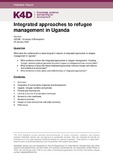| dc.contributor.author | Idris, Iffat | |
| dc.coverage.spatial | Uganda | en |
| dc.date.accessioned | 2020-01-28T13:08:35Z | |
| dc.date.available | 2020-01-28T13:08:35Z | |
| dc.date.issued | 2020-01-24 | |
| dc.identifier.citation | Idris, I. (2020). Integrated approaches to refugee management in Uganda. Helpdesk Report 716. Brighton, UK: Institute of Development Studies. | en |
| dc.identifier.uri | https://opendocs.ids.ac.uk/opendocs/handle/20.500.12413/14991 | |
| dc.description.abstract | Uganda has been a global leader in implementing an integrated approach to refugee management in which refugees enjoy essentially the same rights and access to jobs and services as locals. This approach has benefited both refugees and host communities: the former have land and (limited) livelihood opportunities, the latter benefit from improved services for all and the positive effects of refugees on the local and wider economy. But both still face significant challenges: refugees struggle to become self-reliant, while host communities have to cope with increased competition for resources and services. Rising refugee numbers coupled with funding shortfalls are exacerbating host community-refugee tensions, and raise questions about the sustainability of Uganda’s approach. This review identified several studies conducted over the past three years by key international development agencies (including the World Bank, UNDP2, WFP3) which assess the impact of Uganda’s integrated refugee management approach. There was also other grey literature as well as academic papers. The evidence base is thus quite strong, albeit with scope for more in-depth research on specific aspects (e.g. access to specific services, impact on women and other groups). A number of common themes emerge: poverty, aid dependence, food security, vulnerability, land policy, labour force participation and wages, alternative livelihoods, barriers, women and the labour market, access to services, impact on host communities and wider economy, financial constraints for Uganda, social cohesion, and cost effectiveness. | en |
| dc.language.iso | en | en |
| dc.publisher | IDS | en |
| dc.relation.ispartofseries | K4D Helpdesk Report;716 | |
| dc.rights.uri | https://www.nationalarchives.gov.uk/doc/open-government-licence/version/3/ | en |
| dc.subject | Development Policy | en |
| dc.subject | Governance | en |
| dc.subject | Rights | en |
| dc.title | Integrated Approaches to Refugee Management in Uganda | en |
| dc.type | Helpdesk | en |
| dc.rights.holder | © DFID - Crown copyright 2020 | en |
| dcterms.dateAccepted | 2020-01-24 | |
| rioxxterms.funder | Department for International Development, UK Government | en |
| rioxxterms.identifier.project | K4D | en |
| rioxxterms.version | VoR | en |
| rioxxterms.funder.project | 238a9fa4-fe4a-4380-996b-995f33607ba0 | en |

